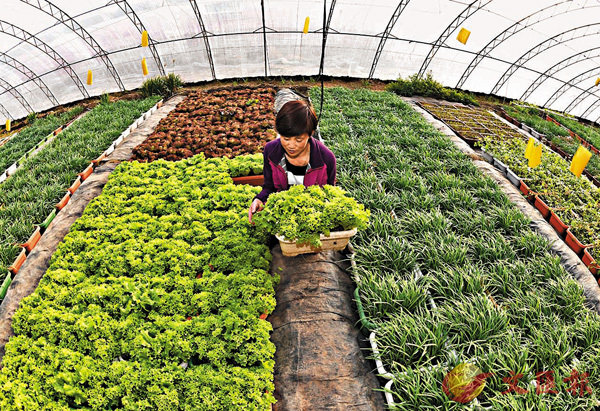 ■有機蔬菜在種植過程中應不使用任何農藥。 資料圖片
■有機蔬菜在種植過程中應不使用任何農藥。 資料圖片【原文】下文摘錄自香港《文匯報》2019年5月6日報道︰
蔬菜是人類主要食糧,若進食受污染的(contaminated)菜蔬,或會嚴重影響身體健康。香港浸會大學(Hong Kong Baptist University)香港有機資源中心(Hong Kong Organic Resource Centre)就本港蔬菜含除害劑殘餘(pesticide residue)進行調查,多個樣本被驗出含有除害劑殘餘,其中兩個超出香港標準,分別超標一倍及10%,更發現部分自稱有機蔬菜有殘餘農藥。調查並發現4個菜檔張貼過期或無效的有機認證書副本,其中兩個有機農場(organic farm)更是已被中心撤銷認證資格的農場。
中心於去年9月至11月期間,在本港17區的濕街市、街舖、有機商店及有機農墟,收集60個本港和內地蔬菜樣本,包括菜心(choi sum)、白菜(Chinese White cabbage)及莧菜(Chinese spinach)進行檢測。結果顯示,60個樣本均不含重金屬(heavy metal)污染;惟有43個樣本被驗出含除害劑殘餘,佔所有樣本的71.7%。另外4個本地自稱有機、1個內地自稱有機和1個內地認證的有機蔬菜樣本亦驗出除害劑殘餘。
調查結果指出,有兩個樣本的除害劑殘餘超出香港標準,分別是購自黃大仙(Wong Tai Sin)樂富街市(Lok Fu Wet Market)的本地自稱有機莧菜,其「氯氰菊酯」(cypermethrin)殘餘含量為每公斤4.02毫克,超出香港標準每公斤2毫克一倍。氯氰菊酯可引致抽搐、痙攣、噁心、嘔吐甚至昏迷等症狀。
至於購自荃灣(Tsuen Wan)楊屋道街市(Yeung Uk Road Market)的內地常規菜心,其「敵百蟲」(trichlorfon)殘餘含量為每公斤0.11毫克,超出香港標準每公斤0.1毫克的10%。另一購自西區(Western District)士美非路街市(Smithfield Road Market)的本地常規菜心,其「敵百蟲」殘餘含量為每公斤0.1毫克,達到標準上限。進食「敵百蟲」可刺激進食者的神經系統,令其心律不正、昏迷,也有機會因大腦受損而致神經錯亂或癱瘓。
中心總監黃煥忠(Jonathan Wong Woon-chung)表示,若以世衛(World Health Organization)標準計算,市民進食是次調查中最受污染的菜蔬,對健康構成的風險仍算低,在一般食用情況下,不會對健康構成即時不良影響,但對素食者(vegetarian)、小童及蔬菜愛好者的影響相對較高,建議市民應進食各類蔬果,避免偏食某種類型,烹調前應先用清水沖洗及浸泡不少於半小時。
中心亦抽查547個菜檔,調查商販銷售有機產品情況,發現有4個菜檔張貼(display)過期或無效的有機認證證書,其中兩個有機農場更已被該中心撤銷認證資格。黃煥忠表示,已將個案轉交海關(Customs and Excise Department)跟進,並促請政府立法規管有機產品,監督有機證書和標籤的使用。
漁農自然護理署(Agriculture, Fisheries and Conservation Department)署長梁肇輝(Leung Siu-fai)回應指出,留意到有內地認證的有機菜含殘餘農藥,但只佔少數,要再跟進是否因為環境污染或其他原因導致。被問到會否立法規管有機食品市場,梁肇輝就指,香港的有機產品市場較小,立法對業界和市場發展未必有正面作用。
Pesticides found in 70% of vegetable samples, including organic ones
【譯文】Vegetables are important part of healthy eating for human beings, yet, eating contaminated vegetables can seriously affect our health. The Hong Kong Organic Resource Centre of the Hong Kong Baptist University had conducted a survey on the level of pesticide residues in vegetables in Hong Kong and found that a number of samples contained excessive pesticide residues, in which two of them exceeded the limits by 100% and 10% respectively, and even some self-proclaimed organic vegetables were found with such substances. It was also discovered that four food stalls posted up copies of expired or invalid organic certificates and two organic farms had actually been disqualified by the centre.
During the period from September to November last year, a total of 60 samples of locally and mainland-grown vegetables, including choi sum, Chinese White cabbage and Chinese spinach, were collected from wet markets, organic stores and organic farms in 17 districts of the city. The results showed that all 60 samples did not have heavy metals but 43 were found containing pesticide residues, accounting for 71.7% of all samples. Furthermore, 4 local samples of self-proclaimed organic vegetables and 1 from the mainland, together with another 1 certified as organic in the mainland, were all tested positive for pesticide residues.
The results of the survey indicated that 2 samples were found with pesticide residues exceeding the local standards, with one of them being the self-proclaimed organic Chinese spinach sold at the Lok Fu Wet Market in Wong Tai Sin. It was detected with 4.02 mg/kg of the contaminant of "cypermethrin", doubling the standard amount of 2 mg/kg and hence posing a health risk of causing symptoms such as convulsion, cramp, nausea, vomit and even coma.
Moreover, the choi sum originated from the mainland brought at the Yeung Uk Road Market in Tsuen Wan was detected with the pesticide "trichlorfon" reaching a level of 0.11 mg/kg, which is 10% above the standards of 0.1 mg/kg. Another locally produced choi sum purchased from the Smithfield Road Market in the Western District was also found containing such substance at 0.1 mg/kg, reaching the upper limit the standards. "Trichlorfon" may have an impact on the nervous system, resulting in arrhythmia, coma, neurological disorder or paralysis due to brain damage.
Professor Jonathan Wong Woon-chung, director of the centre, said when compared with the standards of the World Health Organization, eating pesticide-tainted vegetables should only pose low health risk without immediate adverse effects, but it may still have a bigger impact on vegetarians, children and vegetable lovers. He suggested avoiding sticking to only several types of vegetables and washing them for at least half an hour before cooking.
An on-site study for 547 stalls found that 4 of them displayed outdated or invalid certificates and 2 organic farms had actually been disqualified. Wong said the cases were directed to the Customs and Excise Department for follow-up, as well as urged the government to consider introducing legislation to regulate organic products, the certification of organic food and its labeling.
Director of the Agriculture, Fisheries and Conservation Department Leung Siu-fai noted that a small proportion of organic vegetables certified in the mainland contained pesticide residues and said the government would follow up on whether the vegetables were contaminated due to environmental causes or other reasons. When asked if legislation to regulate the local organic market was needed, he said such market was small and it might not have any positive effect in the development of the industry.■龐嘉儀
Q&A
1. 香港有機資源中心於何年成立了「香港有機資源中心認證有限公司」(Hong Kong Organic Resource Centre Certification Limited)?
2. 承上題,該公司獲得了哪個國際機構的認可資格,證明其認證工作已達到國際水平?
3. 獲「有機產品(Organic)」認證的加工產品須有多少個百分比的有機材料?
4. 獲「含有機成分產品(Made with Organic)」認證的加工產品須有多少個百分比的有機材料?
5. 本港哪個政府機構負責監管有機食品?
Answer
1. 2002年
2. 國際有機運動聯盟(International Federation of Organic Agriculture Movements (IFOAM))
3. 不少於95%
4. 不少於70%但不多於95%
5. 食物安全中心(Centre for Food Safety)

